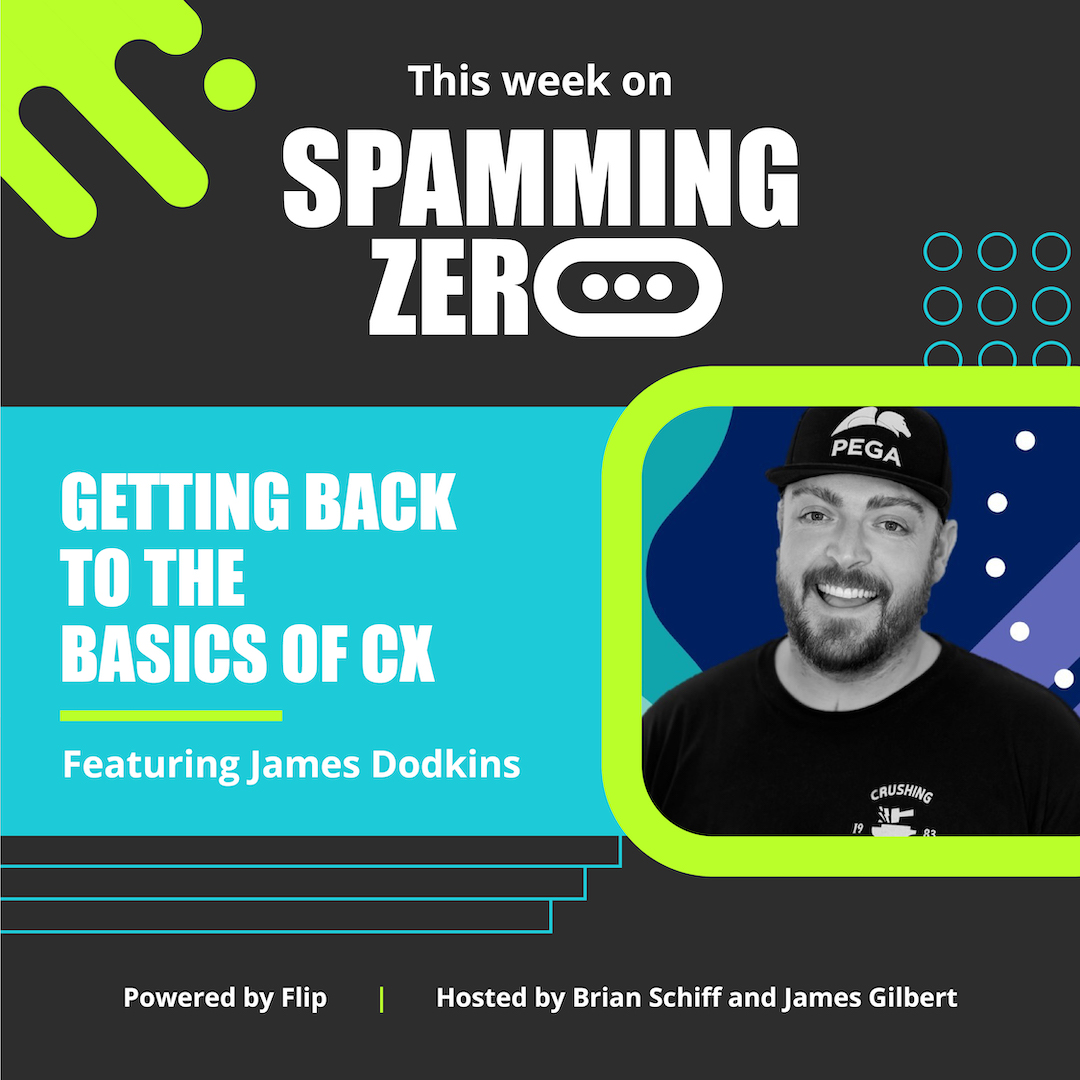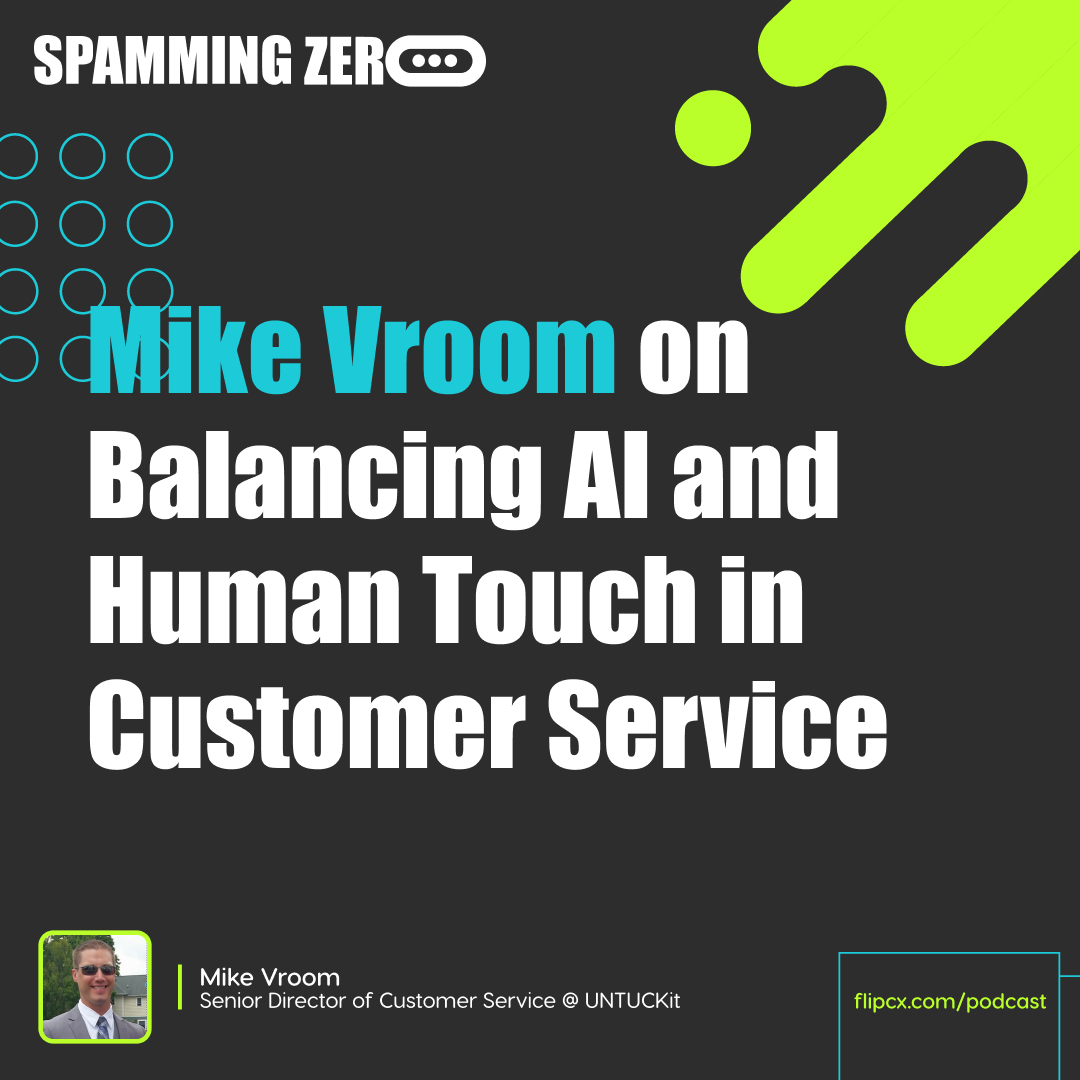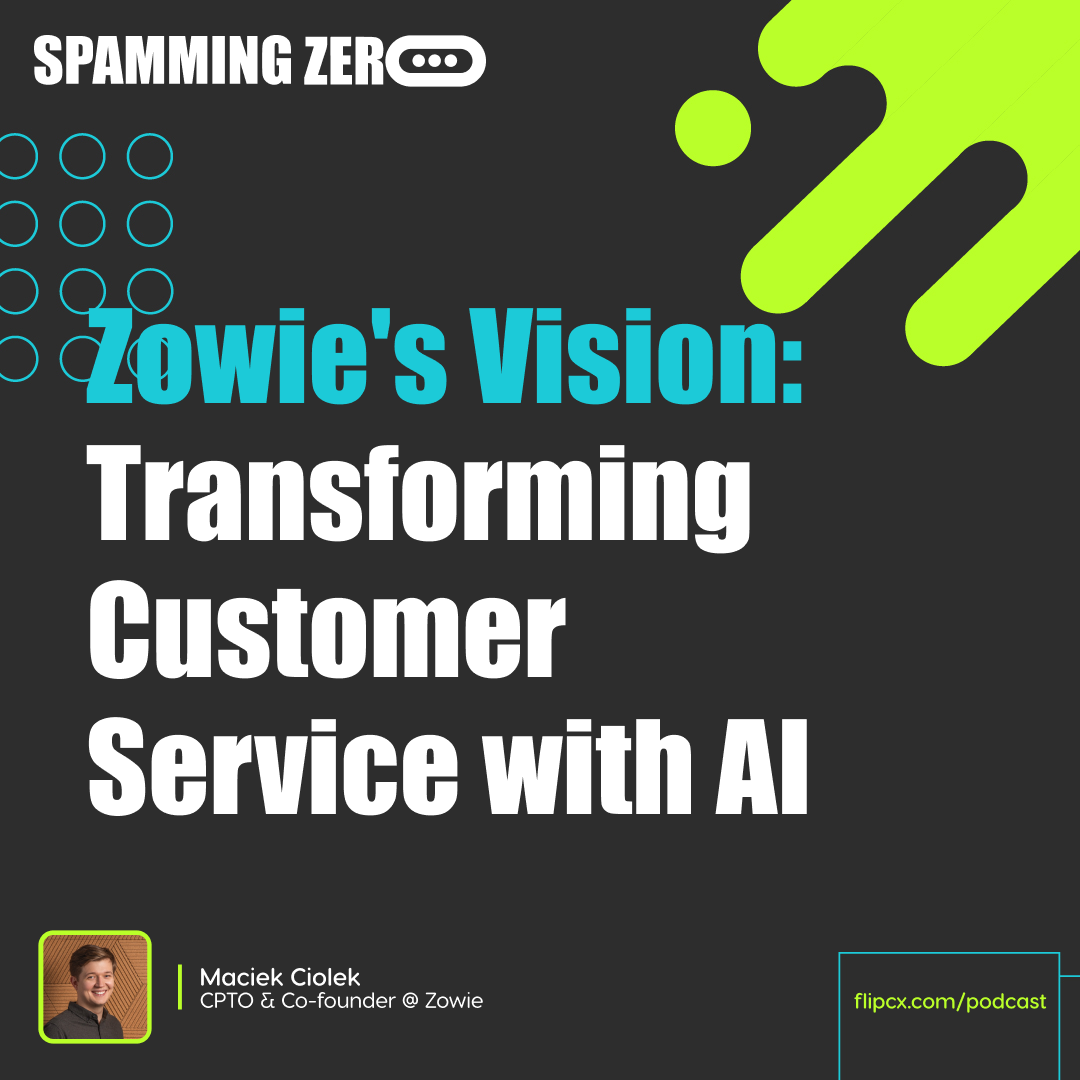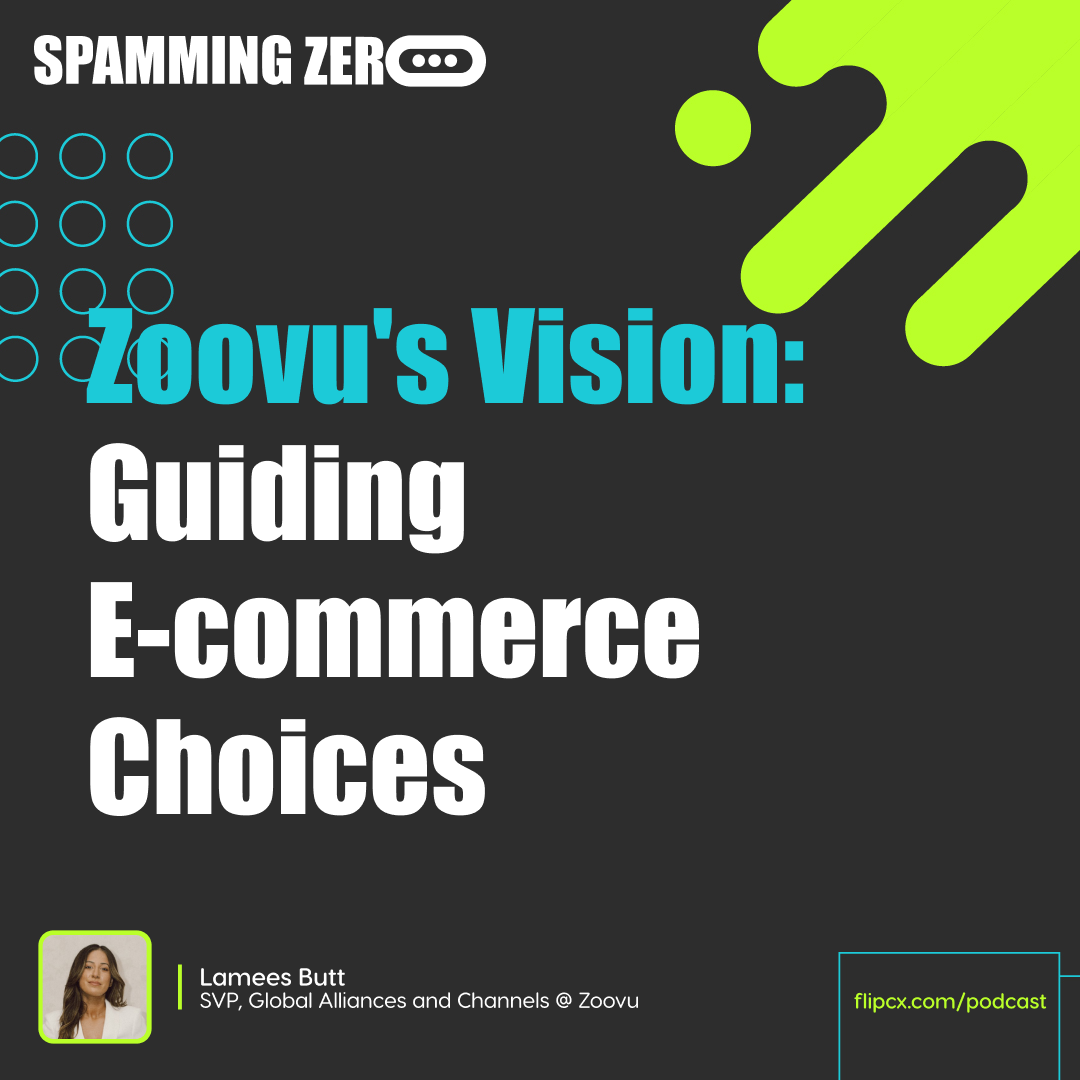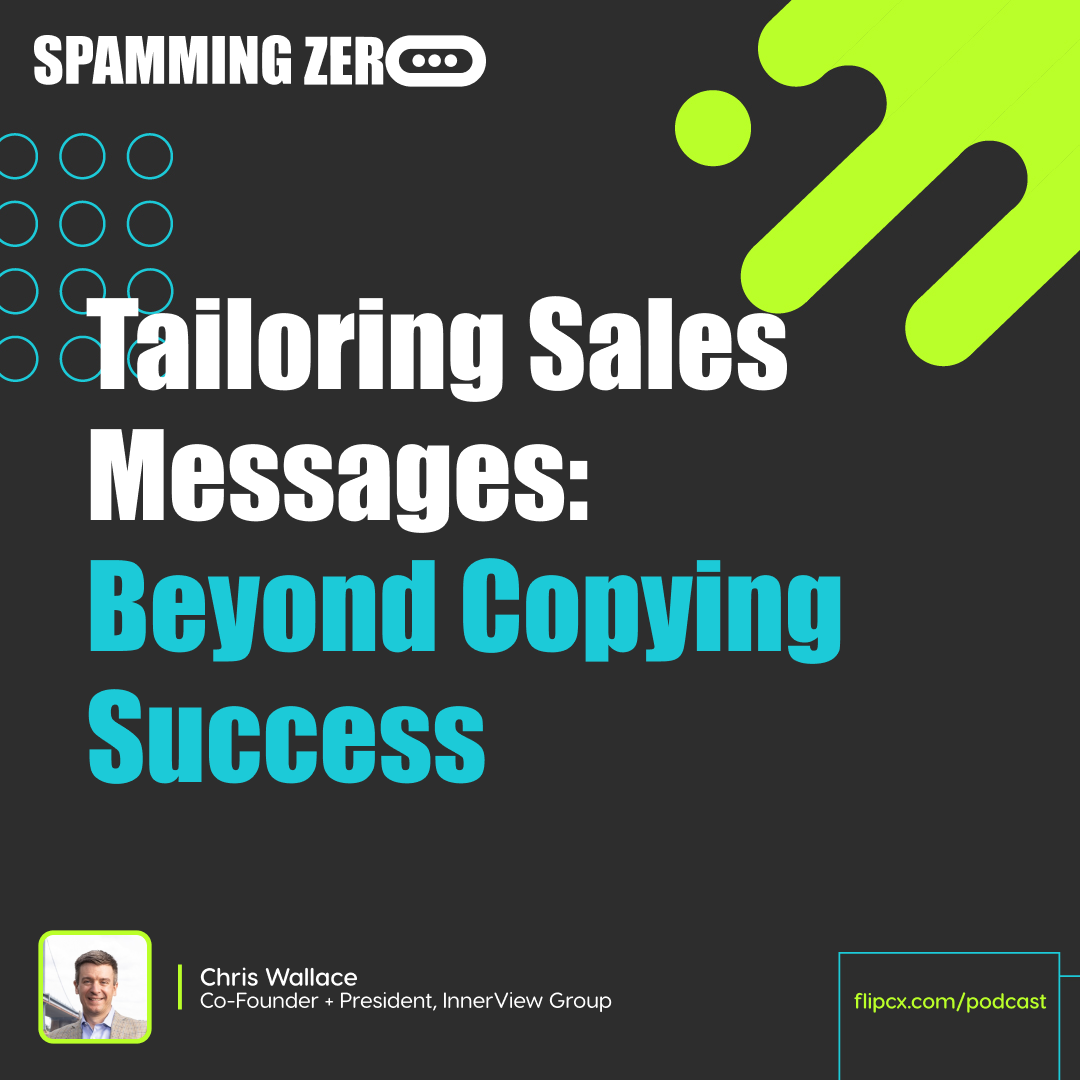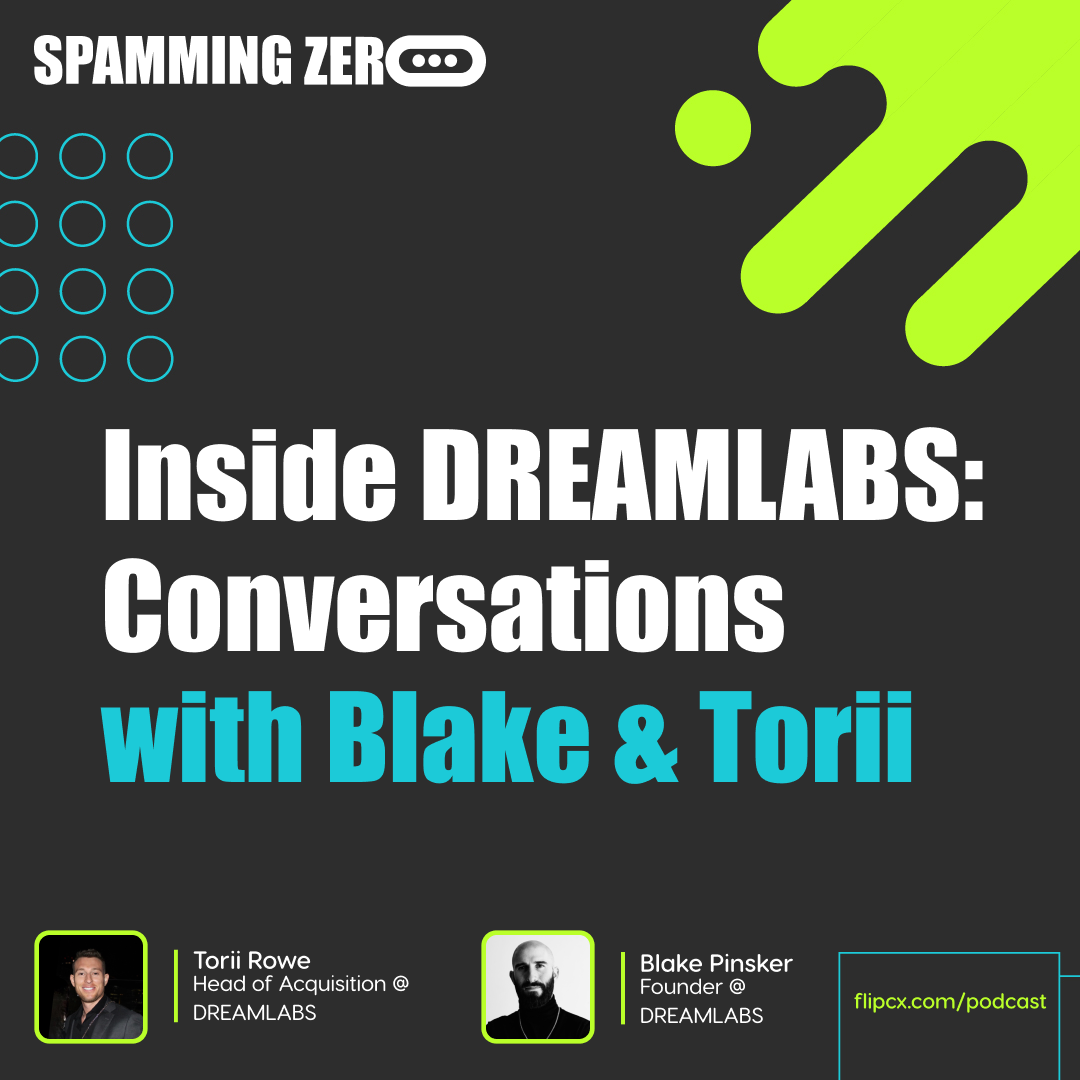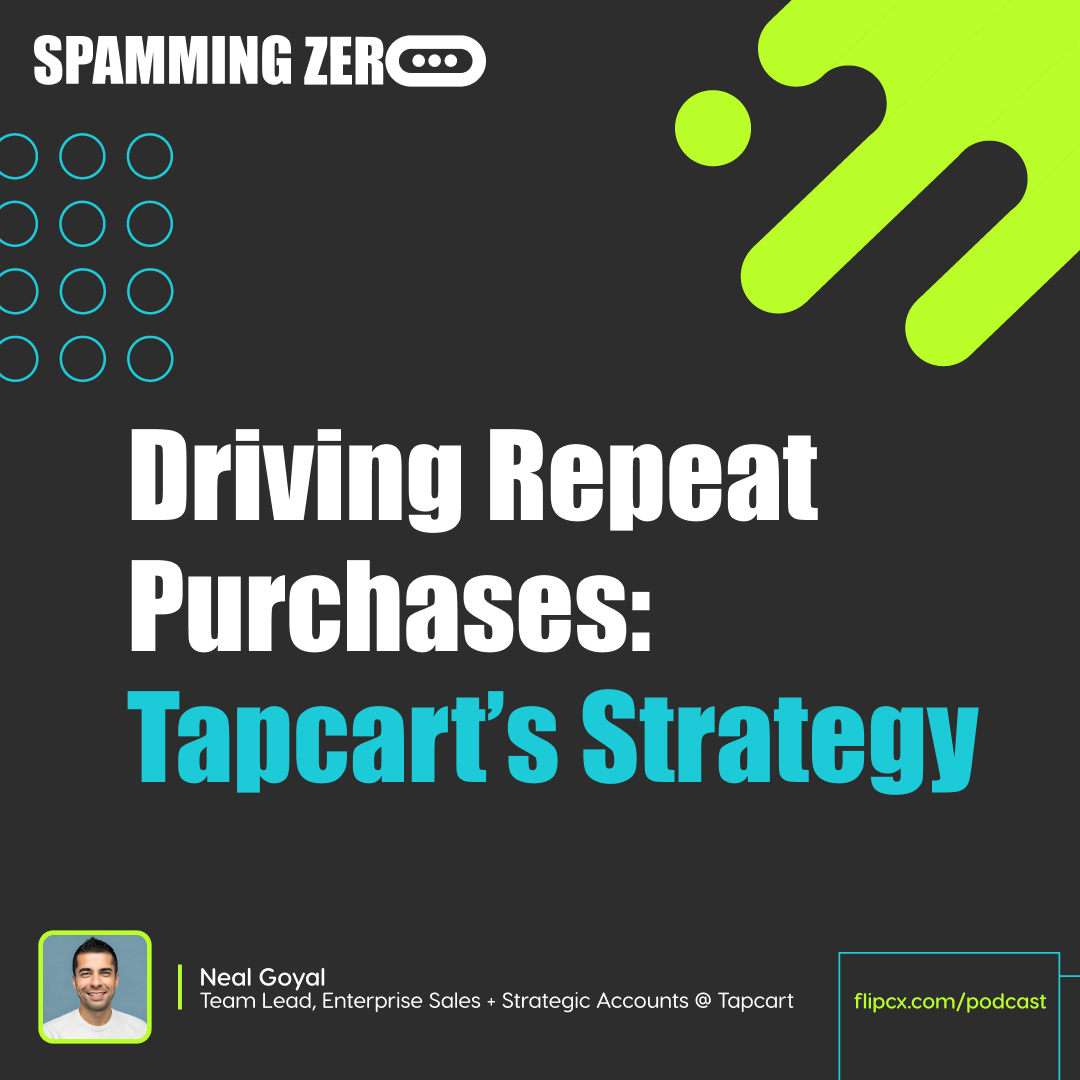Episode 5: How To Rock Your CX Basics
- 0.5
- 1
- 1.25
- 1.5
- 1.75
- 2
James Gilbert: I'm James.
Brian: And I'm Brian.
James Gilbert: And this is Spamming Zero. Welcome to another episode of Spamming Zero. I'm your host today, James Gilbert. Today, Brian is not going to be able to make it. So unfortunately, we're not going to be able to see his smiling face. You get my ugly mug with my beautiful beard, and we're going to have a fun guest today, one that I actually am very inspired by. Here's why. He created his persona around music, which I happen to love. And it is something that is near and dear to my heart. Today, we're going to be joined by James Dawkins. He is the CX rockstar. He's a CX evangelist at Pegasystems. And also, today's topic is going to be super important for those of you who are maybe just getting started on your CX journey, or if you're already in the thick of it, there are some very fundamental things that we want you to learn today. We're going to be talking about the basics of customer experience and why you need some of these things in place today. Welcome to the show, James, appreciate you joining us today on Spamming Zero.
James Dodkins: Well, thank you for having me. I feel very privileged to be here.
James Gilbert: James, I was in my intro. I was talking about how inspired I am by your music and how you came to be with this persona that you are today, which is the CX rockstar, speaking all over the world. Can you give the audience a little bit of a flavor of what that is and how you came to be?
James Dodkins: Yeah. I'll give you the short version. Essentially, I used to be a natural, real life, legitimate award winning rockstar. Traveled around the world, released albums, had a video on TV, all that fun stuff was in the magazines. Then I went into the corporate world and it was slowly killing my soul. So after a little while, fast forward a little bit, I was like," You know what? I want to do something a little bit different. I want to stand out. And I want to use this music career that I've had to help people learn about customer experience in new and fun and interesting and engaging ways." So realistically, that's why the CX Rockstar was born. There was one main quote that made me look at everything differently, and it was from a guy called Jerry Garcia from the Grateful Dead. Do you know the guy I'm talking about?
James Gilbert: I do not.
James Dodkins: Well, he is the... Well, was the vocalist and guitarist from Grateful Dead. And he said," Don't try and be the best in the world at what you do. Try and be the only person in the world that does what you do." And it kind of hit me all at once. I'm like," You know what? I'm trying to do this corporate thing that is slowly killing me, both metaphorically and literally." And I was miserable. I was like," Why not do something that I'm going to love? Why not talk to people about the two things I love the most in the world; customer experience and music." So that's really where this came from.
James Gilbert: I love it. And as somebody who was very inspired by music early on, it does something to us. Music has a very unique ability to help us remember things. It has a very unique ability to tie emotional memories to things that... Like you hear a song, you feel, and you remember certain moments that are just so pivotal in your life. They shape us.
James Dodkins: Yeah.
James Gilbert: And that's what is so powerful in my mind about music. Music is, I think, an unforgotten thing that businesses could be using more of in customer experience. Just for the record, my opinion.
James Dodkins: Yeah. I mean, the thing is, it's either using music itself or using the principles behind music. And that's one of the things I talk about quite a lot. I mean, you speak about that there. Music makes people feel a particular way. I'm a Metallica fan. And Metallica music makes me feel a particular way when I hear it. And it's a way that won't necessarily make sense to a lot of people, unless they're a Metallica fan and then they get it completely. But the point is, I've got a particular relationship with Metallica and that relationship is essentially, it's a foundation of lots of little moments that have been built up over the years, listening to their music, learning their songs on guitars, seeing interviews on TV, reading about them in magazines. And it made me realize there is a pyramid of relationships, which I may as well tell you about now as we're on the subject. So you've got moments. We as people, not just as customers, but as people, have hundreds of thousands of moments every single day. Groupings of these moments create experiences. The way those experiences play out, create emotions within a good or bad. Now those emotions that we feel in real time, the way that we store them is as memories and the sum of all of our memories with another party. And that could be a rock band, a friend, a family member, or even a company, is our relationship with that company. So I think we can look to music and realize, You know what? There are some exact parallels between music and the business world. And it's stuff like that I really want to explore.
James Gilbert: I love it. And I think you're onto something. I think it's something that's going to continue to get bigger and bigger and bigger. The more that brands use their social media accounts, the more that they... There was actually a post that I saw the other day on LinkedIn that I thought was really fascinating. There was a massive TikTok star that did a quick post and they were like," Hey, how come none of you are thinking about the tone of music in your brand guidelines?" And I was like," Wow, that's actually really fascinating to think about." And it took us down to spiral. Anyway, that's not even remotely what we're here to talk about. That being said, you've said you're a Metallica fan, which tells me that you're obviously like a rockstar. You like rock. So I'm going to ask you a really strange question. Tell me a band that you've recently listened to that you'd be embarrassed by.
James Dodkins: I wouldn't be embarrassed by anything because I love music. I love all sorts of music. The thing is, I love essentially all types of music. Actually, I do have an answer for you. I do. I do. So long story short, I took my wife away for her birthday. We were at a really cool place and there was an ABBA tribute band. I do not like ABBA. I like all sorts of music apart from ABBA. It makes me... You know, when you cringe so hard that your bones click, that's what it does to me.
James Gilbert: The history of ABBA, they were edgy at that time of life. They were bringing different types of music, lyrics to life that had never been done before. So even though you may not love them, it did probably shape some of what you listen to today.
James Dodkins: I can respect what they've done in the music world whilst hating everything about their music.
James Gilbert: Fair enough. All right. So let's dive into the topic. Today, we're going to be talking about the basics of customer experience. Why are we talking about the basics of customer experience? Because one of the things that we talked about in our pre podcast chat was, we tend to get so caught up into like," Oh, let's do predictive. Let's do all this analysis on our customer experience. Let's make sure that it's proactive." Those are the holy grail of customer experience. And sometimes, it's just the basics that we forget about. And you talked about a stat in particular that I want bring up. I don't want to dive into this. And that's that 96% of customers that actually never complain. So you have a massive amount of people out there that are having a bad experience. They don't complain. They're not going to do anything. All they're going to do is leave. Let's unpack that for a second. Why do you think that happens?
James Dodkins: So you are right, supposedly, according to statistics that are always correct. 96% of dissatisfied customers will not complain. So you've got a 100 dissatisfied customers there, but only four of those people are actually going to take the time to complain. And there's a massive amount of the remaining 96% that will just silently leave and never use you again. And of course, that's going to differ from industry to industry. The point is, not everyone is the type of person who will complain, just like not everyone is the type of person that fills in feedback surveys. Not everyone is exactly the same and that's what makes our life so cool and interesting. But you've got the majority of people out there that either won't complain because their note is not going to make any difference, won't complain because they know they're not going to get their issues solved, won't complain because they just don't have the time or patience to do so. So if you are only out there fixing problems for the 4% of people that complain, which is going to be a very specific type of person, you're missing a massive opportunity because you've got all these other people out there that are just as dissatisfied but don't have the propensity to actually pick up the phone or sit down and type an email to complain. So I think that's a big problem. What do you think? Do you think it's a big problem?
James Gilbert: I think it's a massive problem. As a matter of fact...
James Dodkins: It's a big thing.
James Gilbert: You and I were talking about this. You're not one to complain. I'm not one to complain. Right? But there was a moment a few years ago. Oh man. Hopefully, I don't get in trouble from putting them on blast here, but here we go. All right. I am a father of four children, right? So sometimes-
James Dodkins: Four?
James Gilbert: Yeah, four. Four. Yeah. It's crazy in my house. My wife is an amazing person to have to deal with that while I work. And I'll tell you what, sometimes, dinner just needs to be quick and easy. And sometimes, the result of that was Little Caesars. It was going to Little Caesars, grabbing pizza. It happens, just so happens. We did this one evening. And me and my wife were... I had a really, really long day at work. She had a really, really long day. She was like,"I don't really feel like cooking." I was like," Okay, let me go grab pizza." I went and grabbed pizza, Little Caesars. It's always our go- to quick meal. No problem. So we go get it. And my whole family, all my kids are scarfing that thing down. And we flip open a piece of the pizza. It's down to the very last one, and we find what looks like mold. So we're like," Okay, what the heck is going on here?" And then we look at the rest of the pizza and again it looks like mold. So I kindly went back to the store, I took the pizza and I said," I'd like a refund. Yes, we ate this whole pizza pretty much, but we just barely noticed that it has mold on it." And we showed them and it was very interesting how they handled it. I normally don't complain at all, but I was like," I just want my money back, whatever you want to do. Or give me a credit and you can make it right later." I was very, very open to it. So they get their manager, the manager comes and is like," Hey look, that's actually not mold." And I'm like," What do you mean it's not mold. It looks like mold. It smells like mold. It even tastes like mold." I was like," It's definitely mold." Like," No, this is from the stickers that we put on our pizza." Well, back in college, I worked at some pizza joints, so I know what that's like. So I knew that they were lying to me. I was like," Why are you lying to me? That's stupid. Just give me a free pizza for like two months down the road and make sure that your pizza's not moldy anymore. It's pretty simple stuff." Well, they didn't do that. And so I, for the first time really that I can remember, I actually went to social media and I complained about it. I took a picture. And within seconds, corporate Little Caesars called me on the phone. How they got my phone number? I have no idea. But they called me on the phone and they're like," Look, we're really sorry about this. We'll give you free pizza for the next three or four months." And I was like," well, I wasn't asking for that. I was just asking for a simple solution. I came to you guys and trying to help." And I think these are the fundamental basics that we sometimes forget about when it comes to customer experience, is allowing the customer, like if they do have a problem, allowing it to be fixed in a much faster timeline than we as the business think it needs to be solved. Right?
James Dodkins: Yeah.
James Gilbert: So that's just one tiny experience. And that's probably one of the few that I've ever complained about. But I did do it. I went to social media, and I'll tell you what, there's something about that action that customers have gotten the habit of to get a response. It happens all the time in the airlines industry, right?
James Dodkins: Yeah.
James Gilbert: Like, oh, delayed flight, whatever. Right? I'm going to go to social media. And you see this... There's an entire website actually just about whole time.
James Dodkins: Yeah.
James Gilbert: Oh man.
James Dodkins: inaudible as customers, we've become what's known as prosumers, which is like professional consumers. It's very clever. And we've become really, really good at being customers. And the way we complain is one of those things. There are other things, for example, it is very unlikely we ever go into any store to buy anything without having done our research beforehand. We've looked online, we've found the exact make, the exact model, how much it costs in a million different stores. We've looked at the reviews. We know what Mary from Stockholm, who's an ABBA fan I imagine, thinks about the product, which is another weird thing about us as prosumers. We are more likely to trust the opinion of a stranger who we have never and will never meet then actually trust the word of a company, but maybe that's a conversation for another day. And we go into the store and we know all of this stuff. It's like, just think about the last time you went to the doctor, when was the last time you went to the doctor without having Google diagnosed yourself? We all do it now. We're all very good at being customers. Now, when it comes to the complaint side of this, we've realized that the traditional avenue to complaints is kind of crappy. Can I say crappy, because I'm going to keep saying crappy.
James Gilbert: Say whatever you want on here.
James Dodkins: Super crappy. All right. It's very crappy. Incredibly crappy. And so we go through the traditional channels and it just doesn't work. So we've found ways to circumvent them, which most of the time is screaming online as loud as we can. And we've realized that," Ah, if we do this in front of people, if we kick up enough of a scene, they'll fix it a lot quicker." And it's companies that are teaching us to behave in this way, because if their traditional channels worked, or better yet they would get in front of it and reach out to you the moment they know something's gone wrong, you wouldn't have any of these problems. That is like the holy grail. That is what would solve all of this, if you could proactively recover that experience. When you notice, as a company, something's gone wrong, you would save the people going online and spreading the bad sentiment about you online. But you'd also save that other 96% that are going to silently leave and just never use you again. So the question is, with the pizza, did you give him a second chance?
James Gilbert: Yeah, we definitely give him a second chance. And that's the thing that I think is also a really important lesson to learn, right? It's not so much the bad experience that people are having, it's so much that you're willing to fix it in a timeline that's appropriate to the customer, and it's so much that you're going to actually fix the problem. And that's kind of brings me to the next point. I want us to list some basics. I will start. Having a phone number is a basic thing. There are so many brands out there that don't even have a phone number. I think that's a big problem. Here's a second one. 24/ 7 support. It doesn't mean that you have to have agents or things 24/7 on the clock helping, right? Or maybe it does. But nonetheless, I still think that you got to have 24/ 7 support. Those are my two. You name some others.
James Dodkins: Well, let's talk about those ones because they're good ones. So the phone number thing.
James Gilbert: Yeah.
James Dodkins: It's not that companies don't have phone numbers. It's that they bury them so deep in their websites that you can't find them because they don't want you to find them. Because if you find them, they'll call in little tip for people. People don't like chatbots. I love them because they're usually the quickest way to get the phone number if you just type in what's your phone number over and over again. But anyway. But the thing is, I've had seen chatbots that are only open between 9: 00 in the morning and 5: 00 at evening. You're a robot, mate. Why are you not open 24/ 7? All little things. I was in Vegas last year. Was it last...? Yeah, it was last year. And as I was coming back, they changed all the COVID rules so I didn't really know what I was supposed to do. And so I go on... I'm not going to name the airline because I don't want to get sued. But I went on the airline's website and I go to do the thing. And it's saying," Ah, because of the increased demand, we are now working with a smaller team of people." And I'm like," Wait a sec. What?" They put two things together. Didn't make any sense. So they're saying," Guys, we've got increased demand right now. So the way we're going to solve that is work with a smaller team." I'm like," That doesn't even make any sense." And they said it as if I was just going to go," Oh, well, yeah, that makes sense." And it was so bad. And none of the channels were connected. And this is the thing. Earlier, when I speak about those moments, the moments that make experiences, that create emotions, that get stored as memories, that build those relationships with companies, unfortunately, most of the moments we share with companies nowadays are service moments. Their service experiences is either going to be phoning up to change your address or trying to change a payment date or querying a bill or something like that. And companies have got... I get it. It's hard. We've had to deal with all these new channels that have come up. So okay. Back in the day, we had it easy. We didn't think so at the time, but we did. You'd have like one or two products and one or two channels, your actual store, and then email maybe, or your contact center. You'd have those two channels. Now, we've got a billion different products as a company and a billion different channels. You've got email, you've got your contact center, you've got your chatbot, you've got WhatsApp, you've got Facebook messenger, you've got the Apple one, whatever that's called. Probably TikTok is going to come soon. There's going to be TikTok business messenger. You heard it here first, guys. I don't know if that's really happening, but it probably will. You've got all these millions of different things. So you've got all your channels up here. If you're not watching this, I'm doing a hand thing in the air, if you're just listening. Then you've got all your systems back here that actually have to get the work done. So your customers are coming in here and you've got all this mess working between them, trying to get everything working. And what it means is, nothing's connected. And it means that anytime they have to make any changes, they hard code the logic into the channels. So you have to go to your WhatsApp and make a change, you have to go to your chatbot and make the change, you got to go to Facebook messenger and make the change. And that's the issue I had with this company because every single one of their channels was completely different in the message that it was telling me. Some of them were telling me the old stuff, some of them were telling me stuff that was different that I assumed was new stuff. But then I thought," Well, hang on a second. Is that just really, really old stuff?" And I mean, that's where Pega's good. And this isn't a pitch for Pega at all. But Pega comes along and puts a brain in the middle. You give the brain all the information and that controls your channels and your backend. So if you ever need to make a change, you do it in the middle and it immediately changes no matter what the channel. So you have the same contextual journey across all the different channels. And again, this was the problem I had with this company. I started online. I started on the chatbot. Then I tried to call in and that didn't work. So then I had to go on through the app. And it didn't know who I was, it didn't know why I was calling, the journey wasn't joined up. It was like I was a brand new person every single time. And in the end, I didn't get the information and I just had to chance it. And just at the airport, I had to Jedi mind trick the guy. I'm like," No, this is fine. The thing I've got..." I'm like," This is the correct papers," or whatever. So there was a bit of a rant there.
James Gilbert: No. But that's the thing you're on. Everyone that calls... I shouldn't say everyone, that's a general statement. But a lot of people that call or contact support, there are inquiries that are common and those are called intents. Right? Customer's intent on why they're actually reaching out to you. And the most popular one is, especially if you're in e- com or an industry that requires like an order, is like, what's my order status? Where's my order?
James Dodkins: Yeah.
James Gilbert: So these are some of the basics that I think are missing in a lot of business today. I think that a lot of that intent can be easily automated and it doesn't need to touch a human ever. Right? And I think that there's such a worry that we have to bridge this AI and human element that we're so worried that we're going to automate too much, that we then put people on hold for hours to get a 30 second response.
James Dodkins: Yeah, it's crazy. So one of the things I was going to mention was trackability. And we've spoken about pizzas already, but think of the Domino's Pizza tracker, that is the best example of a trackable experience. For me, trackability is about letting the customer know the exact process they've got to go through to achieve whatever it is they're trying to achieve in the Domino's Pizza when it's a pizza. And it lets you know exactly where you are in the process. If you could give your customers that visibility and that line of sight to see where they are in the process and what's coming next, what to expect next, set in those expectations, you call volumes would go down. I don't know by how much. But by a lot is what I'm guessing. That's my guess. By a lot. Because the amount of people, they're calling just to track something, what is the status of this? Because companies aren't allowing customers to check for themselves or being proactive by letting them know this is the status, this is what's next, this is what you've already done, this has happened, this is where you are. This is what to... So that trackability part for me, I think, is massive. So I'm glad you brought it up.
James Gilbert: James, what do you think the businesses can do today to start implementing more of these basics? Give the audience something to pull from.
James Dodkins: This might be a bit of a controversial one, but there's so much talk out there about wowing your customers or creating an emotional experience or exceeding expectations. I mean, just get the basics right, first. None of that stuff matters unless you can do the normal stuff just properly. And it's like, companies are trying to leapfrog that section of it. Just get the basics right. Just be consistently consistent and brilliantly boring. I love boring companies. You heard it here first. I love boring companies that just do what they're going to say they do consistently. Like McDonald's, for example. It's not a particularly healthy example, but we're on a junk food episode apparently. But I don't need McDonald's to create an emotional wow experience. I need them to just give me my food quickly and correctly. That is it. Just do that please. And the way I look at it is there's two types of experiences. You've got transactional experiences and emotional experiences. There are some experiences that should be emotional. They're in the minority. Me phoning up a utilities company to change my address, you don't need to build rapport with me and build an emotional connection to change my address. Just do that thing. And maybe it is different for different customer types. Maybe I'm a particular type of customer that doesn't want to have an emotional relationship with my bank. I don't know. But my wager is, most people don't care. They just want stuff done. There's almost an arrogance to it for like a bank to be like," Oh, we are going to build emotional relationships with our customer." Why? Very few people sit there and dream of having an emotional relationship with any company. It's weird. It's weird to assume that they want to. Now, don't get me wrong. If I'm calling up an insurance company to claim on a dead relative's insurance policy, okay, I get it. You build that rapport. You work slowly. You are very empathetic and you build that emotional relationship there. That's perfectly fine. If I call up to change my payment date, just do the thing. Please just do the thing. You're literally putting all my ranty questions. You're asking me things that are making me incoherently rant. So I hope the listeners are enjoying.
James Gilbert: That's the point, James. That's the whole point. Here's another point of advice that I would give those that are listening. I have a data background. That's something that I'm very passionate about. And it drives me wild when I have to call a phone number and I'm a current customer and they don't have my information. Then I get passed like, okay, the first line of defense cannot help me. Okay. So then they pass me onto another department and they ask for the exact same information. I'm sorry, but you can fix that. That is simple stuff, folks. All that is, in my mind, like as fundamental as sharing CRM data. I mean, it really can be that simple. And you don't have to over- complicate this. You don't have to over- architect it. That is a fundamental basic thing that if you are not doing today and your teams are not in, at least the same system, be able to see that customer and not have to continue to provide the exact same information over and over. This is a true story. It was father's day yesterday. Had a good time with my kids. But over the weekend, we went to a place called Lake Powell, and we spent some time out on the lake. And my son is going to have surgery coming up here. And so we needed to have some very specific information answered by the insurance company. So I called the insurance company up. I'm not kidding you. I got transferred to six different people over the course of a three and a half hour phone call. Three and a half hours. Okay? And all six people asked for the exact same information. Guys, this was not like little info. This was my social security number. This was my address, my date of birth. I had to give them my everything, six different times. Now, here's the thing. Not only do I have a problem with that and how that should be a basic fundamental thing from a data flow perspective, but I shouldn't have to, for our security reasons, give that information that many times over the phone ever. And I had to.
James Dodkins: That's crazy one. It's, again, not wanting to do the Pega thing too much, but it's one of the things we're trying to help companies with at the moment, with case management. Because again, it's like that idea of you've got your channels, you've got your systems, and everything's moving between them and things get lost and it's like a new case every single transfer. And what we are trying to do is say like," No, if you have this center out approach where you start with the outcome, the thing the customer's trying to achieve and keep that context throughout the entire journey so that if you do have to get transferred, the new person can look at exactly the conversation you've had, the exact things that have happened before, they know exactly who you are, what type of customer you are, the thing you're trying to achieve." Because of course, there's always going to be complex situations that knowledge management can't help with. And there's always going to be complex situations that next best actions can't help with. That's going to happen. So if you do need to be transferred, the least you can do is have that case follow the customer so the new person knows. And it winds me up so badly, even when... So I had to call my bank the other week on a call up and another thing, it's like," Please enter your customer number, beep, beep, beep, beep, beep. Please say your name. Please tell me your dog's inside leg measurement." And he's asking me all this stuff in the IVR. And then I finally get through to the person and they ask me all the same stuff again. I'm like," Bro, I just gave it to the computer woman at the beginning. Why are you asking me again?" And then...
James Gilbert: Right.
James Dodkins: So this is the annoying thing. The call got dropped. It happens. Okay. I get that. So I sit there and I go,"All right, I'm going to wait. I'm going to see if they call me back because surely there should be some sort of procedure knowing when a call gets dropped, gets put into a queue to get a call back. So I wait like 10 minutes, 15 minutes. I'm not right. So they're not calling me back. So I call back. I get put on hold again for another half an hour. It wouldn't be that difficult for a system to go," Oh, hang on a second. This person's called once. It seems like the call maybe got dropped before a resolution was achieved. Maybe we should put them to the front of the queue." But no, do the thing again. Press the buttons again. Tell them about my dog's intimate leg details again. Still the person ask me the details again. And of course, by this point, I'm getting frustrated and I've got a particular caveat when I have to call these things. I let the person know I'm currently frustrated with this process. I'm not frustrated with you personally, I'm frustrated with the process. So if at any point I come across as frustrated, please know it's not with you personally, it's with the process. So I always caveat that when I'm annoyed on a phone. Because the thing is, it's not the dude's fault that's taking the call. He's just sat there, just taking the call, he's got no control over how the company decides to set up their processes and systems. And of course, not everyone's as nice as me. So these poor agents have sat there all day taking ranty, angry calls from people that direct... That's got to be bad for your soul, I imagine. I don't think there's been any studies done.
James Gilbert: It's the number one job in the world that is... it has a highest churn at any job. There's a reason why that is, right? The business problems, we fundamentally funnel, right, to them rather than automating some of those things. And again, you're making people wait for a very long period of time to get simple things answered. Automating some of those things are the basics. And here's the other thing that I will say. Whenever I've brought up this topic with others, one of the things that's always asked of me is like," Okay, well, how do we manage expectations with our customers on what is a basic need versus what we feel like is a basic need?" Well, here's the fundamental truth. Just put yourself in the customer's shoes. Call your own support line. Be a customer and call your own support line and see how long it takes for you to get your own problem answered. Guys, this is so simple. Sometimes, the fundamentals of customer experience can be rooted back to that one fundamental truth.
James Dodkins: Yeah.
James Gilbert: Put yourself in their shoes. And think about it from your own perspective, if you were doing what they were doing, would you be okay with it?
James Dodkins: Yeah. I heard about a package delivery company before where all the executives sent a package to themself just to find out what the process was. And 60% of them didn't get the package. I don't think they did anything though, which is kind of bad. Because they always got," Oh yeah, but that's a one off. That must have been just this time. I'm sure it's..." Because that's not how the process should go. And that's the difference. It's looking at how the process should go versus how the process does actually go. And this comes back to this idea of automation. Automation is a fantastic tool when the experience and the process is the right one to start with. Because if you've got a crap process and you just automate it, you just get fast crap. And we usually take medicine for that. So you shouldn't do that. But as long as you know that that process is correct and right and achieving the things it needs to achieve, then you can automate it. And of course, that frees up the time of the agents to really be able to focus on the more complex issues and the issues that are more interesting for them to deal with and those ones that need that emotional connection. And there's an interesting concept in science around behavior. It's like, what is behavior? So we're looking at agents, they're leaving, they're getting frustrated, they're unhappy. Let's look at what behavior actually is. There's a formula to it. I can't remember, but just Google it if you're that interested. But essentially, behavior is the person and the personality of that person and the situation they're in combined. That's what creates behavior. But the interesting thing about it is, the situation has a much heavier weighting on who the person is. So if you've got a 100 people in a burning building, it doesn't matter how brave you are, how tall you are, how short you are, what your political views are, most of you are probably just going to run out of the building because the situation dictates the behavior. Now, when it comes to call center agents or contact center agents, or some people will now call it experience center agents, Ooh, but these people, we got to think, it doesn't really matter who they are as a person. You could hire the best people in the world, but if you are putting them in a situation that is essentially unwinnable with crappy systems that don't work properly and really tense environments where they're having to deal with angry people all day, that situation is going to cause them to behave in a particular way. So for me, looking at it, if you want to change the behavior of the agents, if you want to make them better on the phones, happier on the phones, stay for longer, then you got to look at their situation. And a lot of that is about the technology that they're using on a daily basis. And we put them in organizations. You think of the pyramid. They're at the bottom of the pyramid. They're the least paid, least invested, and least valued members of any organization, yet they're the ones that are interacting with our customers. How does that make any sense at all? The analogy I like to use is actually of a football. I'm talking about football, the type you play with your feet. So soccer for your American heathens out there. But so football with your feet, soccer. The people that get paid the most in any soccer organization is not the doctors, it's not the chairman, it's not the manager, it's not the coaches, it's the actual players because they are the ones at the end of the day with the sole responsibility for delivering that experience to the fans. Now, I'm not saying we should be paying our contact center agents millions of dollars. I'm not saying that. I'm just saying, when you look at it, it's backwards to have the least paid people, the least valued people, the least trained, the least invested in people in the organization as the ones who have the sole responsibility on their shoulders for delivering that experience to the customers. It's crazy and it needs to change.
James Gilbert: Things are very, very backwards in a lot of ways. This is a veering off topic and more so on who you are as a person because we like to bring the human element a little bit to this. If you could change the world with one thing, what would it be? Or another way to phrase it, what do you think this world needs the most?
James Dodkins: I mean, it's going to sound like something you put a slogan on your t- shirt or on a vinyl sticker on your wall, but a bit more kindness. Lots of not kind people out there. I don't think it's that difficult just to be nice to people, whether you've got different political opinions or if you're just in a bad mood and you root someone in a call center or someone serving you in a restaurant or something. I don't know, man. I think it's a real red flag on someone's character when they're just mean to everyone or they think it's like a badge of honor to be mean to people. I'm not about that. And I think it's bad vibes. So there you go. I think one thing that would... I mean, there's millions of things that would make the world a better place. But if there's one that would have vast, meaningful, instant impact, it would be just a little bit more kindness.
James Gilbert: Couldn't agree more. It's funny how many people say that. It's something all of us want and need. And don't get me wrong. No one's perfect. We can all have our moments where we make a mistake, but it's how you recover from that. I think that also builds character and helps you know that.
James Dodkins: Yeah, sure.
James Gilbert: So James, it's been a pleasure having you on the podcast. Thank you so much for joining us. If you are listening to this podcast, please subscribe and give us a rating. We would love to also hear from you. Reach out to James at redroute. com. If you have any podcast topics that you want to talk about, we'd be happy to have you on. If you want to be a guest, we'd be happy to talk to you about that as well. But today, please listen to what James had to say. It is awesome feedback. Awesome advice. Focus on the basics before you go into the wow moments and go into the perfection of trying to create magical moments. Which can happen, but over time, you got to get the basics down first. Thanks for joining us.
DESCRIPTION
Good CX rocks.
In the case of James Dodkins—the CX Rockstar, CX Evangelist at PEGA, and International Keynote Speaker—that statement is true from every angle. And, if you’ve not yet had the pleasure of hearing him speak, buckle up for an awesome ride.
Dodkins sits down with RedRoute’s own James Gilbert to talk CX basics, and why it’s so essential we get back to them. This week, on the Spamming Zero Podcast.
What’s Covered?
- James’ Journey: from award-winning rockstar to award-winning CX rockstar
- The 96% of dissatisfied customers who silently leave, and what you can do about it
- Today’s customers = prosumers
- Getting proactive
- A deeper dive into CX basics + how to implement them
- The role automation can play
- And more
Ready for more fantastic Spamming Zero conversations ahead? Listen, rate, and subscribe on Casted, Apple Podcast, or Google podcasts.
Today's Host
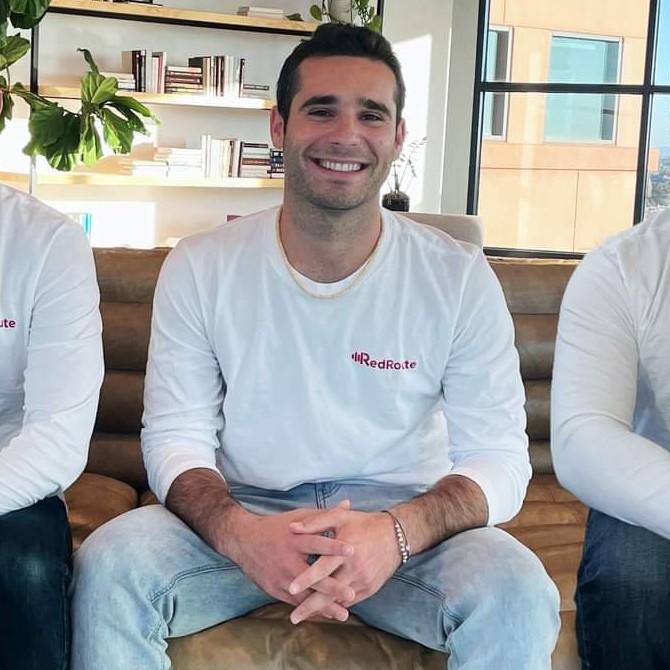
Brian Schiff
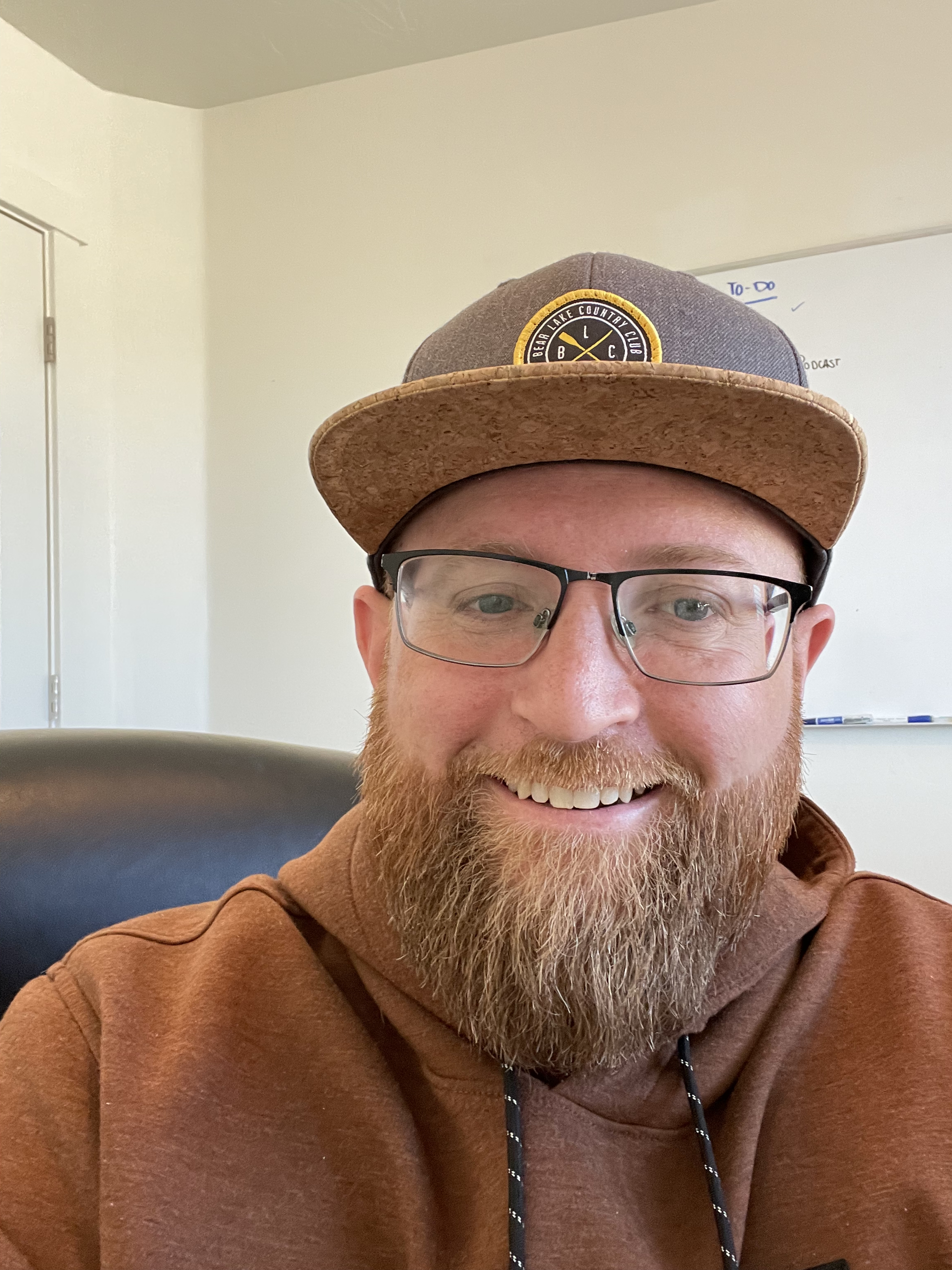
James Gilbert
Today's Guests


